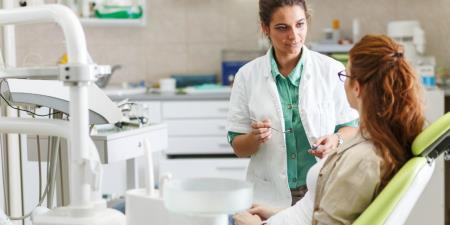
A brief check for oral cancer should be part of your regular dental check-up-and it's a good idea to ask for the screening if you aren't already getting it, say university experts.
Dentists and dental hygienists in particular should be conducting oral cancer screenings on all patients, according to University of Alberta dentistry experts.
"Oral cancer screening should be taking place on patients as part of regular dental visits," said Seema Ganatra, an oral pathologist at the U of A. "Unfortunately, it's not clear how often this is being done by dentists or dental hygienists."
Ganatra said a soft-tissue examination of the head and neck area-an effective way to spot cancer growths, either visually in the mouth or physically under the skin in the neck and throat area-can be conducted by dentists and dental hygienists within as little as two minutes. If a lesion or lump is found, and persists after two weeks, the dentist should refer the patient to an oral pathologist or oral surgeon for evaluation and treatment.
"But my impression is that it's not being conducted consistently among oral health providers," she said.
Since there are no data tracking how often patients are being screened for oral cancer, Ganatra and two more U of A dentistry faculty say they would like it to be more widely and consistently used among the profession.
"Our scope of practice includes conducting a head and neck exam along the muscle groups and lymph nodes under the chin and around the neck, and an intra-oral assessment of the tongue, particularly the lateral borders, and a visual assessment of the oropharynx," said Alexandra Sheppard, assistant director of dental hygiene clinical education at the U of A.
A screening also entails questions about alcohol and tobacco use, as well as asking patients about sexual practices, partners or vaccinations.
"We teach dental hygiene students how to conduct screenings for oral cancer," said Sheppard, adding that hygienists are in a better position than general physicians to check for oral cancers because they may see patients more often and they are looking down into people's mouths with bright lighting.
"That's why it's a good idea to ask for a screening at your next dental visit if it's not offered," she added.
Sexually transmitted oral cancer on the rise
The U of A dentistry faculty members are raising this issue at a time when one particular kind of oral cancer, HPV or human papilloma virus-related cancer, is on the rise among men between 40 and 55 years old.
"Dentists and dental hygienists have a larger role to play in health care than just managing the health of teeth. Oral health care is a major component of Canadians' overall health," pointed out Minn Yoon, an assistant professor in the School of Dentistry.
Almost 4,400 Canadians will be diagnosed with HPV-linked cancers this year and about 1,200 die from it annually, according to the Canadian Cancer Society and Public Health Agency of Canada's annual report on cancer statistics released in the fall of 2017.
Mouth and throat cancers now represent about a third of cancers that are caused by HPV in Canada.
"The risk of oral infection rises with the number of sexual partners, and oral sexual partners, one has had," explained Minn Yoon. "Men are four times as likely to get HPV-related oral cancer," she added, pointing out that men also take longer to clear HPV infections from their body.
Almost 80 per cent of the entire population has had HPV infection at one point in their lives. For the most part, the body clears it out safely on its own, she said, adding that a small percentage of HPV cases develop into oropharyngeal cancer. "We don't know why it takes longer for men, but one theory is that women have some natural immunity men don't."
"The good news is that the outcomes of those who get an HPV-related oral cancer are much better than those who have oral cancer related to tobacco and alcohol," pointed out Ganatra.
Because HPV-related cancers tend to manifest as tumours in the neck and throat area due to local spread, it's all the more important for the dental community to be conducting regular screenings to catch it as early as possible, she added.